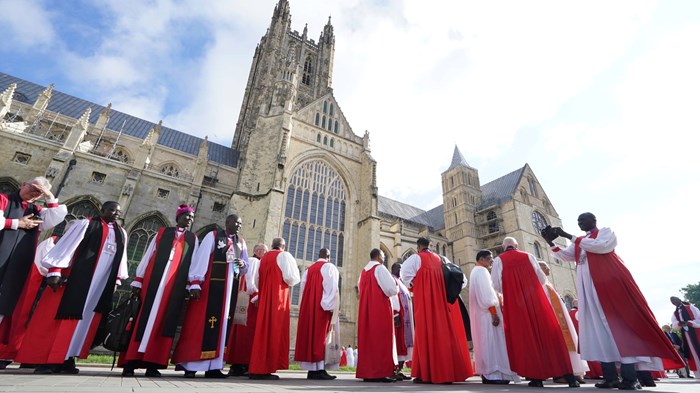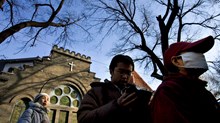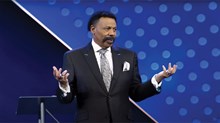
When conservative Anglicans from around the world gather next month in Rwanda, they could begin to explore a new framework of leadership in response to the Church of England’s recent move to let its clergy bless same-sex marriages.
The decision around the blessings, a compromise made at the Church of England’s General Synod in February, provoked bishops representing a majority of the world’s Anglicans to threaten a break with the mother church of their communion.
“The Church of England has departed from the historic faith passed down from the Apostles” and “disqualified herself from leading the [worldwide Anglican] Communion as the historic ‘Mother’ Church,” according to a statement endorsed by 12 archbishops aligned with the Global South Fellowship of Anglican Churches (GSFA).
The bishops represent Anglicans in Africa, Asia, and Latin America. One member of the group, archbishop Foley Beach, represents conservative Anglicans in North America who have broken with the more liberal Episcopal Church.
“As much as the GSFA Primates also want to keep the unity of the visible Church and the fabric of the Anglican Communion, our calling to be ‘a holy remnant’ does not allow us [to] be ‘in communion’ with those provinces that have departed from the historic faith and taken the path of false teaching,” the GSFA stated, a reference to endorsement of same-sex marriage, among other issues.
The Church of England still won’t perform same-sex ceremonies and maintains that marriage is a lifelong union between one man and one woman, but it has now opted to allow clergy to offer prayers and liturgies at civil marriages. At last month’s synod, the Church of England also said it repents of its failure “to welcome LGBTQI+ people and for the harm that LGBTQI+ people have experienced—and continue to experience—in churches.”
The move could widen the already significant rift among the Anglican Communion, which includes about 85 million adherents across 165 countries.
The GSFA was not alone in denouncing the Church of England’s action. Also opposing the move were Anglican primates in Nigeria and Asia, along with conservatives in North America and England. Though battles over theology and ethics in the Anglican Communion extend back to the 1970s, Anglican observers say the present controversy could represent a decisive shift south in the communion’s center of gravity—where Anglicans are more numerous and more conservative.
A hundred years ago, more than three quarters of the world’s Anglicans resided in Britain, according to the Pew Research Center, but today most Anglicans are in Africa.
The Anglican Communion includes more than 40 self-governing provinces and churches across the world, each with its own ruling bishop. Being “in communion” with one another includes mutual agreement on key doctrines and welcoming Anglicans from other churches and provinces to participate in the sacraments. The Archbishop of Canterbury, currently Justin Welby, is regarded as the “first among equals” amid Anglican bishops.
The GSFA says that could change. The Global South bishops are “no longer able to recognise” Welby as “first among equals,” they said, because he led his church’s General Synod to make decisions that “run contrary to the faith and order of the orthodox provinces in the Communion whose people constitute the majority in the global flock.”
GAFCON, a movement of worldwide conservative Anglicans, agreed with the sentiment. “It’s time for the Primate of All England to step down from his role as ‘first among equals’ in leading the Anglican Communion,” GAFCON said in a February 9 statement written by Beach, chair of the GAFCON Primates Council. “It is now time for the Primates of the Anglican Communion to choose for themselves their ‘first among equals.’”
For its April 17–21 meeting in Rwanda, GAFCON has adopted the theme “To Whom Shall We Go?” The movement was already at odds with other Anglican churches to recognize civil marriages of same-sex couples, including the Episcopal Church in America, the Anglican Church of Canada, and the Scottish Episcopal Church.
The world’s largest Anglican Church, the Church of Nigeria, appears to welcome any leadership change afoot in the communion.
“The Anglican Church is at the threshold of yet another reformation,” Nigerian archbishop Henry Ndukuba said in a February 12 statement, “which must sweep out the ungodly leadership currently endorsing sin, misleading the lives of faithful Anglicans worldwide and endangering their prospects for eternity.”
Some Anglican congregations in England are among those disenchanted with the Church of England. In late February, Church of England bishops met with between 150 and 200 clergy members, many of whom were concerned about the General Synod’s approval of blessing same-sex marriages, the Church Times reported.
The Anglican Church in South East Asia also objected to the Church of England’s latest move on gay marriages but will remain in communion with the historic mother church for now.
“Despite our grave reservations regarding the Church of England’s decision, we believe that the unity of the Anglican communion should not be lightly abandoned,” said the bishops of Singapore, West Malaysia, Sabah, and Kuching in a February 18 pastoral letter. “Hence, we will remain in communion with the Church of England while praying fervently for her and speaking boldly for God’s truth.”
For Welby’s part, he seemed open to a change in the Anglican power structure at a February 12 address in Ghana.
“I will not cling to place or position as an Instrument of Communion,” he said, a reference to the leadership structures that hold together the worldwide Anglican Communion. “The role of the Archbishop of Canterbury, the See of Canterbury, is an historic one. The Instruments must change with the times.”
David Roach is a freelance reporter for CT and pastor of Shiloh Baptist Church in Saraland, Alabama.

Support Our Work
Subscribe to CT for less than $4.25/month


















